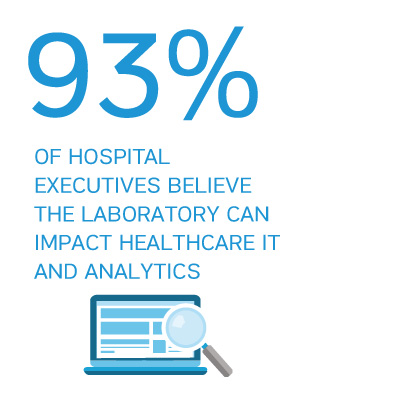Utilizing big data for better care
Jan-Philipp Beck
CEO, European institute of
Technology (EIT) Health
Ramiro Roman
DVP Professional Services,
Abbott Diagnostics
'Big data' is currently THE buzzword in healthcare, and there is growing recognition that the vast amounts of digitized data available could be harnessed to improve the delivery of healthcare services and address major public health challenges. Unfortunately, the sector has struggled to manage the myriad stakeholders, regulations and privacy concerns that must be addressed to create a fully integrated healthcare IT system. Overcoming this through increased automation and integration – with the eventual goal of full digitization – is vital to maximize the potential impact of this data, as well as to demonstrate the role pathology plays in improving population health. Collaboration between the different stakeholders will be essential, as will robust technologies to collate and analyze the varying types and quality of data available. Ultimately, this data can be used to deliver more efficient, patient-centered healthcare and increase oversight of public health – as well as aiding cure discovery and workforce planning – but only if we engage fully with the process and work together to make it happen. Jan-Philipp Beck

Best practices in operational and clinical integration
The global population is growing rapidly, as is the laboratory services sector, but almost nowhere are budgets doing the same. Diagnostic labs have been optimizing processes and lowering costs for a number of years, and in many cases there is little more that can be done. Unfortunately, laboratory services are still seen by many as a commodity, rather than a problem solver that can drive better outcomes for patients, healthcare providers and financial stakeholders alike. To overcome this perception, we need to move diagnostics from a reactive model – identifying what happened, when and why – to a more proactive and predictive approach, providing clinically-relevant, actionable insights into what is likely to happen and what course of action should be taken. Better integration of the laboratory with other healthcare services is essential, allowing the use of advanced data capture, handling and analysis to offer valuable insights into individual and population health. We already have the tools – AI, machine learning and big data analytics – to achieve this and, in many cases, the only thing missing is the will to make it happen. Ramiro Roman







![Tuberculosis Diagnostics: The Promise of [18F]FDT PET Imaging Tuberculosis Diagnostics: The Promise of [18F]FDT PET Imaging](https://res.cloudinary.com/healthmanagement-org/image/upload/c_thumb,f_auto,fl_lossy,h_184,q_90,w_500/v1721132076/cw/00127782_cw_image_wi_88cc5f34b1423cec414436d2748b40ce.webp)



